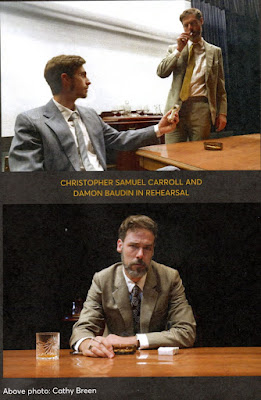Smokescreen by Christopher Samuel Carroll. Bare Witness Theatre Co. at The Q, Queanbeyan Performing Arts Centre, February 2-5, 2022.
Reviewed by Frank McKone
Opening Night February 3
Writer/Director – Christopher Samuel Carroll
Cast: Christopher Samuel Carroll as Glenn; Damon Baudin as Bud
Lighting Designer: Antony Hateley
In a war-crimes trial under way as I write, a witness’s veracity has been challenged because he did not report the murder he saw happen when it happened. The accused was his commanding officer. Though the witness felt guilty at the time for saying nothing, he knew his own career and even safety was at risk. In court years later, no longer on duty or even in the army, “I know what I saw,” he said.
This is the human dilemma presented for an oil industry ad-man, Glenn, in Carroll’s 90-minute two-hander Smokescreen. Bud, working for tobacco companies, already under threat as, literally, a dying industry even 45 years ago when this play is set, in capitalist USA, offers Glenn a new direction away from standard advertising in competition for sales between companies to a much more subtle and effective approach to support investment and profit-taking for whole industries. Regardless of the truth of the destruction of Glenn’s lungs from his need to keep smoking; and regardless of the truth Glenn has only just discovered that burning fossil fuels will destroy agriculture in “ten or twenty years”, he thinks.
Bud’s ploy is simple. Keep it quiet; support social action by any kind of government or non-government group campaigning for “freedom” – that is freedom of choice (to smoke or drive and fly on holiday); keep making money while you can. And that means keep your job and maintain your family.
Carroll’s writing in Smokescreen is simple in its plot – will Bud succeed in persuading Glenn?
The characterisation is anything but simple, as each man reveals – or doesn’t reveal – their true position. The argument is not academic, but has real personal consequences for each of them. The worst thing about the play is that as we watch and listen carefully, we find ourselves being caught out accepting and appreciating Bud’s unethical position and feeling sorry for Glenn’s moral confusion.
The significance of the play, it’s importance today in Canberra (and I would hope in, say, New York, at least off-Broadway) is that we face in reality Glenn’s dilemma and the results of Bud’s ploy of emphasising fake “freedom”. Do we really have any choice but to keep our lives going in the short-term despite the science clearly predicting what Jared Diamond called Collapse in the not very long-term. “My 13- and 16-year-old daughters”, says fictional Glenn 45 years ago, “will still be here in 40 years” when Bud suggests to stop worrying, take a relaxing break and have a cigarette. Just as my 16-year-old grandson will still be here, I hope, in 2050.
The best thing about the play is that it shows a writer, director and actor of depth of understanding in Christopher Samuel Carroll, thoroughly supported by Damon Baudin, Antony Hateley on lights – and by the device of giving pauses significance by the interrupting sound of a jet aircraft overhead. So much fossil fuel for our consideration.

